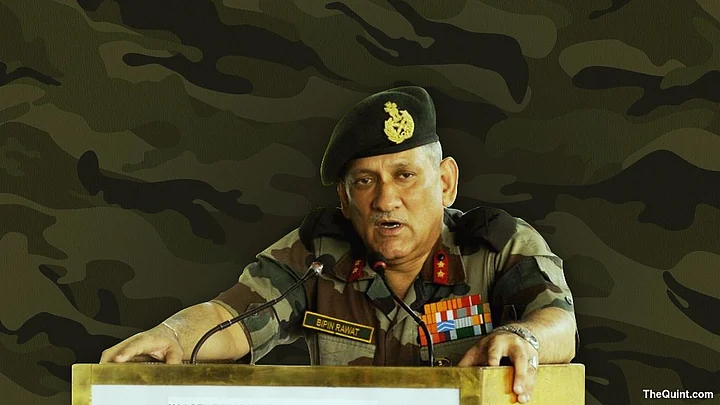In a democracy, the government of the day is well within its right to select an army chief of its choice. The Narendra Modi government has exercised its choice by selecting General Bipin Rawat over the heads of two other senior officers.
Having done so, it should not get into trying to offer explanations for its choice, as it is now doing by citing Gen Rawat's slightly greater experience in counter-insurgency (CI) operations as the clinching factor. In providing such reasons, which anyone with knowledge of the functioning of the army would find difficult to believe, the government opens up its decision to question. And just like the government has exercised its prerogative in its selection of Gen Rawat, it is the prerogative of citizens to question dubious decisions.
Government’s Defence
According to the government, in the current scenario, it wanted to appoint someone like Gen Rawat who, being an infantry officer, has served a couple of tenures in CI operations. The connotation is that such experience would be necessary, or helpful, in carrying out the job of army chief.
But the fact is that there’s nothing strategic about conduct of CI operations, which, in any case, are under the ambit of the army commander, not the chief. It is not clear what strategic directions the COAS will give an equally experienced army commander without encroaching upon his domain, or what advice the government expects based on his tactical experience in CI ops.
What About MoD Bureaucrats?
It is notable that most bureaucrats in the Defence Ministry advise the government on matters military without any related experience or exposure at all.
Extending the logic of need for specific tactical experience, what if there's an outright war with Pakistan during Gen Rawat's tenure, and the strike corps and armoured divisions have to be employed?
Will the government then replace the chief with an armoured corps or mechanised infantry officer with relevant exposure?
Obviously not, because it is not required.
Chiefs Must Have Vision
To illustrate the kind of things an army chief needs to focus on, let us look at the single biggest decision taken about fighting insurgency – the raising of Rashtriya Rifles (RR) battalions. The man behind this was the then COAS, late Gen BC Joshi, an armoured corps general with no CI experience to speak of.
This single step taken by the government of the day changed the face of CI ops in Kashmir. These are the kind of measures that an army chief needs to concern himself with, as the actual conduct of operations, in counter-insurgency or in war, are handled by the respective army commanders. What the nation and the army, therefore, need are chiefs with vision, not with specific experience, which can easily be compensated by appropriate advice.
Appoint Army Officers in MoD
However, since the government has indicated its preference for relevant experience being an important criterion for those upon whom it banks for advice, it should seriously reconsider the appointments within the Defence Ministry. Instead of generalist bureaucrats in key slots, it should consider appointing army officers with relevant experience. Another possibility could be making a tenure in either Jammu and Kashmir or the northeast compulsory for bureaucrats to be considered for a posting in the Defence Ministry.
Unless the government takes such measures, it would appear that relevant experience/expertise was merely an excuse used to select a candidate it preferred for whatever reasons.
This story was first published on The Quint on 21 December 2016. It is being republished as the current Army Chief, General Dalbir Singh is set to retire on Saturday, 31 December.
(The writer is a retired colonel of the Indian army and has authored four books. He can be reached at @ragarwal. This is an opinion piece and the views expressed above are the author’s own. The Quint neither endorses nor is responsible for the same.)
(At The Quint, we question everything. Play an active role in shaping our journalism by becoming a member today.)
